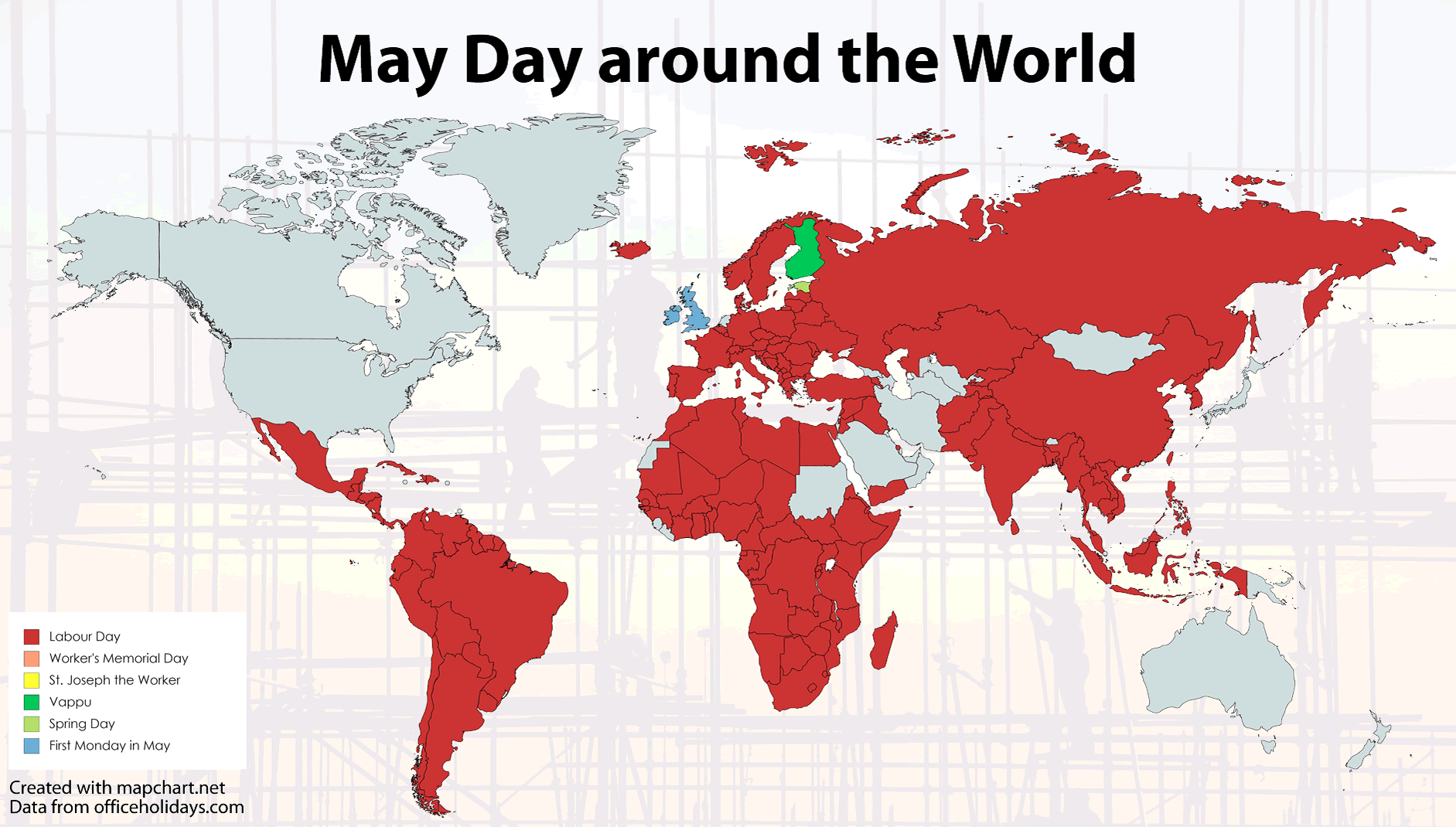When is Labour Day?
This international holiday is observed on May 1st. It is most commonly associated as a commemoration of the achievements of the labour movement. The holiday may also be known as International Worker's Day or May Day and is marked with a public holiday in over 80 countries.
History of Labour Day
The first May Day celebrations focused on workers took place on May 1st 1890 after its proclamation by the first international congress of socialist parties in Europe on July 14th 1889 in Paris, France, to dedicate May 1st every year as the "Workers Day of International Unity and Solidarity."
The date was chosen due to events on the other side of the Atlantic. In 1884 the American Federation of Organized Trades and Labor Unions demanded an eight-hour workday, to come in effect as of May 1st 1886. This resulted in the general strike and the Haymarket (in Chicago) Riot of 1886, but eventually also in the official sanction of the eight-hour workday.
The riots at Haymarket Square in Chicago had begun as peaceful demonstrations over the legal establishment of an eight-hour workday.
At a protest rally on May 4th 1890, a bomb was thrown at the police as they tried to disperse the crowds, resulting in the deaths of several police officers and some civilians.
Though the eight-hour workday was not fully adopted across America until the 20th century, the events in Chicago inspired similar protests across Europe, establishing May 1st as the day to recognise the rights of workers across the world.
May 1st is celebrated as May Day in most countries around the world. In the United Kingdom and Ireland the bank holiday isn't fixed on May 1st but instead is observed on the first Monday of May.
In the 20th century, the holiday received the official endorsement of the Soviet Union, and it is also celebrated as the Day of the International Solidarity of Workers, especially in some Communist states. Celebrations in communist countries during the Cold War era often consisted of large military parades with the latest weaponry being exhibited as well as shows of common people in support of the government.
Curiously (given the origin of the May 1st date), the United States celebrates Labor Day on the first Monday of September (May 1st is Loyalty Day, a legal but not widely recognized holiday in the United States). There is some suggestion that the reason for this was to avoid the commemoration of riots that had occurred in 1886. The adoption of May Day by communists and socialists as their primary holiday has been as another reason for the official resistance to May Day labor celebrations in America.
Canada, Australia, New Zealand, and the Netherlands also celebrate Labour Day on different dates; though that has to do with how the holiday originated in those countries.
May Day has long been a focal point for demonstrations by various communist, socialist, and anarchist groups.

May Day
May 1st was also a pagan holiday in many parts of Europe, Its roots as a holiday stretch back to the Gaelic Beltane. It was considered the last day of winter when the beginning of summer was celebrated.
During Roman times, May 1st was seen as a key period to celebrate fertility and the arrival of spring. The Roman festival of Flora, the goddess of flowers and the season of spring, was held between April 28th and May 3rd.
Traditional English May Day rites and celebrations include Morris dancing, crowning a May Queen, and dancing around a Maypole; festivities which made it a popular seasonal celebration in medieval England.
May Day Traditions in France
In France, on May 1st 1561, the French king Charles IX received a bouquet of lily of the valley flower for luck. The king liked the gift so much that he wanted to do the same and started a tradition of giving lily of the valley flowers to the women at court on May 1st. This springtime flower has been associated with May 1st since Celtic times and is the traditional flower of May.
In France, selling flowers in public is prohibited by law for all except professional florists. This law is lifted on May 1st and individuals are legally permitted to sell flowers in public.
Labour Day in France
Labour Day has been an official working holiday on May 1st since 1947.
On Labour Day in France, public transport is heavily affected. In Paris, buses, and trains will run on a Sunday schedule and there will be no public transport outside of Paris. Most large shops and supermarkets will be closed.
Many restaurants will be closed (especially outside of Paris) and almost all museums will be closed all over France. The major tourist attractions will be open but you can expect long queues.
Many parades and demonstrations take place across France on May 1st. These are organised by various groups, such as trade unions and are called "manifestations".

